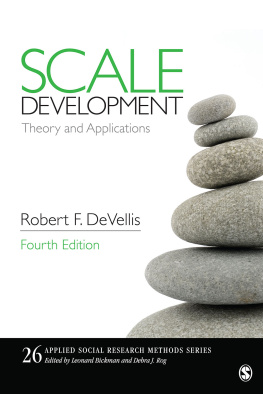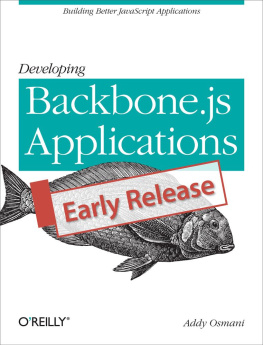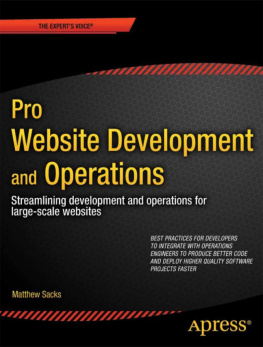DeVellis - Scale Development: Theory and Applications
Here you can read online DeVellis - Scale Development: Theory and Applications full text of the book (entire story) in english for free. Download pdf and epub, get meaning, cover and reviews about this ebook. year: 2016, publisher: SAGE Publications, genre: Romance novel. Description of the work, (preface) as well as reviews are available. Best literature library LitArk.com created for fans of good reading and offers a wide selection of genres:
Romance novel
Science fiction
Adventure
Detective
Science
History
Home and family
Prose
Art
Politics
Computer
Non-fiction
Religion
Business
Children
Humor
Choose a favorite category and find really read worthwhile books. Enjoy immersion in the world of imagination, feel the emotions of the characters or learn something new for yourself, make an fascinating discovery.
- Book:Scale Development: Theory and Applications
- Author:
- Publisher:SAGE Publications
- Genre:
- Year:2016
- Rating:5 / 5
- Favourites:Add to favourites
- Your mark:
- 100
- 1
- 2
- 3
- 4
- 5
Scale Development: Theory and Applications: summary, description and annotation
We offer to read an annotation, description, summary or preface (depends on what the author of the book "Scale Development: Theory and Applications" wrote himself). If you haven't found the necessary information about the book — write in the comments, we will try to find it.
DeVellis: author's other books
Who wrote Scale Development: Theory and Applications? Find out the surname, the name of the author of the book and a list of all author's works by series.
Scale Development: Theory and Applications — read online for free the complete book (whole text) full work
Below is the text of the book, divided by pages. System saving the place of the last page read, allows you to conveniently read the book "Scale Development: Theory and Applications" online for free, without having to search again every time where you left off. Put a bookmark, and you can go to the page where you finished reading at any time.
Font size:
Interval:
Bookmark:
Fourth Edition
- SURVEY RESEARCH METHODS (Fifth Edition) by FLOYD J. FOWLER, Jr.
- RESEARCH SYNTHESIS AND META-ANALYSIS (Fifth Edition) by HARRIS COOPER
- METHODS FOR POLICY RESEARCH (Second Edition) by ANN MAJCHRZAK and M. LYNNE MARKUS
- SECONDARY RESEARCH (Second Edition) by DAVID W. STEWART and MICHAEL A. KAMINS
- CASE STUDY RESEARCH (Fifth Edition) by ROBERT K. YIN
- META-ANALYTIC PROCEDURES FOR SOCIAL RESEARCH (Revised Edition) by ROBERT ROSENTHAL
- TELEPHONE SURVEY METHODS (Second Edition) by PAUL J. LAVRAKAS
- DIAGNOSING ORGANIZATIONS (Second Edition) by MICHAEL I. HARRISON
- GROUP TECHNIQUES FOR IDEA BUILDING (Second Edition) by CARL M. MOORE
- NEED ANALYSIS by JACK McKILLIP
- LINKING AUDITING AND META EVALUATION by THOMAS A. SCHWANDT and EDWARD S. HALPERN
- ETHICS AND VALUES IN APPLIED SOCIAL RESEARCH by ALLAN J. KIMMEL
- ON TIME AND METHOD by JANICE R. KELLY and JOSEPH E. McGRATH
- RESEARCH IN HEALTH CARE SETTINGS by KATHLEEN E. GRADY and BARBARA STRUDLER WALLSTON
- PARTICIPANT OBSERVATION by DANNY L. JORGENSEN
- INTERPRETIVE INTERACTIONISM (Second Edition) by NORMAN K. DENZIN
- ETHNOGRAPHY (Third Edition) by DAVID M. FETTERMAN
- STANDARDIZED SURVEY INTERVIEWING by FLOYD J. FOWLER, Jr., and THOMAS W. MANGIONE
- PRODUCTIVITY MEASUREMENT by ROBERT O. BRINKERHOFF and DENNIS E. DRESSLER
- FOCUS GROUPS (Third Edition) by DAVID W. STEWART and PREM N. SHAMDASANI
- PRACTICAL SAMPLING by GART T. HENRY
- DECISION RESEARCH by JOHN S. CARROLL and ERIC J. JOHNSON
- RESEARCH WITH HISPANIC POPULATIONS by GERARDO MARIN and BARBARA VANOSS MARIN
- INTERNAL EVALUATION by ARNOLD J. LOVE
- COMPUTER SIMULATION APPLICATIONS by MARCIA LYNN WHICKER and LEE SIGELMAN
- SCALE DEVELOPMENT (Fourth Edition) by ROBERT F. DeVELLIS
- STUDYING FAMILIES by ANNE P. COPELAND and KATHLEEN M. WHITE
- EVENT HISTORY ANALYSIS by KAZUO YAMAGUCHI
- RESEARCH IN EDUCATIONAL SETTINGS by GEOFFREY MARUYAMA and STANLEY DENO
- RESEARCHING PERSONS WITH MENTAL ILLNESS by ROSALIND J. DWORKIN
- PLANNING ETHICALLY RESPONSIBLE RESEARCH (Second Edition) by JOAN E. SIEBER and MARTIN B. TOLICH
- APPLIED RESEARCH DESIGN by TERRY E. HEDRICK, LEONARD BICKMAN, and DEBRA J. ROG
- DOING URBAN RESEARCH by GREGORY D. ANDRANOVICH and GERRY RIPOSA
- APPLICATIONS OF CASE STUDY RESEARCH (Third Edition) by ROBERT K. YIN
- INTRODUCTION TO FACET THEORY by SAMUEL SHYE and DOV ELIZUR with MICHAEL HOFFMAN
- GRAPHING DATA by GARY T. HENRY
- RESEARCH METHODS IN SPECIAL EDUCATION by DONNA M. MERTENS and JOHN A. McLAUGHLIN
- IMPROVING SURVEY QUESTIONS by FLOYD J. FOWLER, Jr.
- DATA COLLECTION AND MANAGEMENT by MAGDA STOUTHAMER-LOEBER and WELMOET BOK VAN KAMMEN
- MAIL SURVEYS by THOMAS W. MANGIONE
- QUALITATIVE RESEARCH DESIGN (Third Edition) by JOSEPH A. MAXWELL
- ANALYZING COSTS, PROCEDURES, PROCESSES, AND OUTCOMES IN HUMAN SERVICES by BRIAN T. YATES
- DOING LEGAL RESEARCH by ROBERT A. MORRIS, BRUCE D. SALES, and DANIEL W. SHUMAN
- RANDOMIZED EXPERIMENTS FOR PLANNING AND EVALUATION by ROBERT F. BORUCH
- MEASURING COMMUNITY INDICATORS by PAUL J. GRUENEWALD, ANDREW J. TRENO, GAIL TAFF, and MICHAEL KLITZNER
- MIXED METHODOLOGY by ABBAS TASHAKKORI and CHARLES TEDDLIE
- NARRATIVE RESEARCH by AMIA LIEBLICH, RIVKA TUVAL-MASHIACH, and TAMAR ZILBER
- COMMUNICATING SOCIAL SCIENCE RESEARCH TO POLICY-MAKERS by ROGER VAUGHAN and TERRY F. BUSS
- PRACTICAL META-ANALYSIS by MARK W. LIPSEY and DAVID B. WILSON
- CONCEPT MAPPING FOR PLANNING AND EVALUATION by MARY KANE and WILLIAM M. K. TROCHIM
- CONFIGURATIONAL COMPARATIVE METHODS by BENOT RIHOUX and CHARLES C. RAGIN
Theory and Applications
Fourth Edition
- Robert F. DeVellis
- University of North Carolina at Chapel Hill

- Los Angeles
- London
- New Delhi
- Singapore
- Washington DC
- Melbourne
Copyright 2017 by SAGE Publications, Inc.
All rights reserved. No part of this book may be reproduced or utilized in any form or by any means, electronic or mechanical, including photocopying, recording, or by any information storage and retrieval system, without permission in writing from the publisher.

FOR INFORMATION:
SAGE Publications, Inc.
2455 Teller Road
Thousand Oaks, California 91320
E-mail: order@sagepub.com
SAGE Publications Ltd.
1 Olivers Yard
55 City Road
London, EC1Y 1SP
United Kingdom
SAGE Publications India Pvt. Ltd.
B 1/I 1 Mohan Cooperative Industrial Area
Mathura Road, New Delhi 110 044
India
SAGE Publications Asia-Pacific Pte. Ltd.
3 Church Street
#10-04 Samsung Hub
Singapore 049483
Acquisitions Editor: Helen Salmon
Editorial Assistant: Anna Villaruel
Production Editor: Olivia Weber-Stenis
Copy Editor: Mark Bast
Typesetter: Hurix Systems Pvt. Ltd
Proofreader: Jennifer Grubba
Indexer: Karen Wiley
Cover Designer: Candice Harman
Marketing Manager: Susannah Goldes
Printed in the United States of America.
Library of Congress Cataloging-in-Publication Data
Names: DeVellis, Robert F., author.
Title: Scale development : theory and applications / Robert F. DeVellis, University of North Carolina, Chapel Hill, USA.
Description: Fourth edition. | Los Angeles : SAGE, [2017] | Includes bibliographical references and index.
Identifiers: LCCN 2015043839 | ISBN 9781506341569 (pbk. : alk. paper)
Subjects: LCSH: Scaling (Social sciences)
Classification: LCC H61.27 .D48 2017 | DDC 300.72dc23 LC record available at http://lccn.loc.gov/2015043839
This book is printed on acid-free paper.
16 17 18 19 20 10 9 8 7 6 5 4 3 2 1
Scale development is a rapidly evolving field with new approaches emerging and gaining greater traction. These changes have arisen from a variety of sources, including large-scale efforts to provide more standardized measurement tools across a wide range of contexts. On one hand, these changes are exciting and important. On the other, they make the revision of this text substantially more challenging. As with past editions, my goal is to present complex information in a way that will be accessible to a range of scholars. At the same time, with each revision, I have endeavored to update the material to reflect current trends in the field. Those two objectives at times are diametrically opposed, as some of the newest developments involve advanced and somewhat specialized concepts and methodologies. I have sought to resolve this dilemma by providing context for new advancements and by explicitly differentiating between narrowly and more broadly circumscribed measurement activities and the technical approaches that may suit each. Of course, I have confined my discussion of these issues to the scope and intention of a text that serves as an overview to psychometric approaches rather than a comprehensive review.
The end result has been that every chapter has new material added to it. In , Overview, my review of the history of measurement now includes a summary of how mental illnesses have been classified from ancient times to the present, with an emphasis on more recent activities. That discussion reveals both opportunities lost and others taken.
Font size:
Interval:
Bookmark:
Similar books «Scale Development: Theory and Applications»
Look at similar books to Scale Development: Theory and Applications. We have selected literature similar in name and meaning in the hope of providing readers with more options to find new, interesting, not yet read works.
Discussion, reviews of the book Scale Development: Theory and Applications and just readers' own opinions. Leave your comments, write what you think about the work, its meaning or the main characters. Specify what exactly you liked and what you didn't like, and why you think so.









